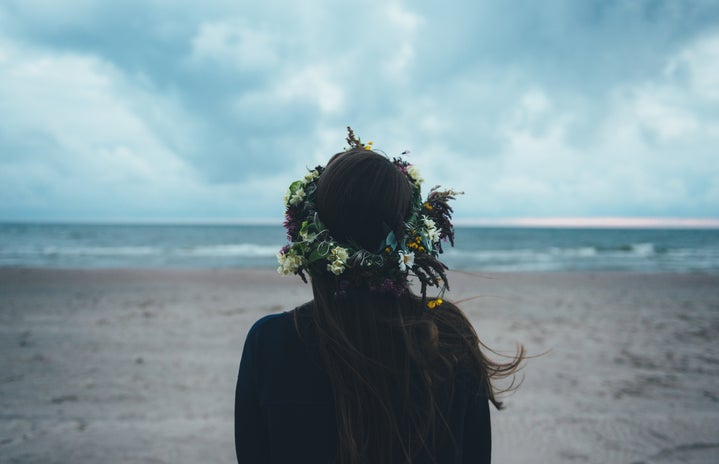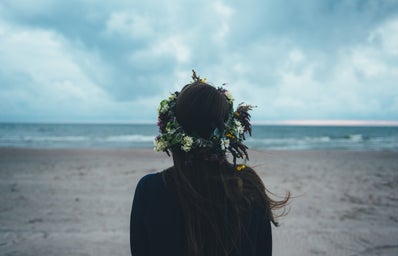Imagine you woke up in a world without shampoo – what would you do? Embrace the feeling of your greasy hippie locks? Feel disgusted and hide your hair under a cap or shawl? Find alternative methods to keep your hair clean and shiny?
Somehow it feels that as of late the idea of using organic and natural substances to wash your hair has become more popular. And it makes sense: many of us opt for organically produced food because what we eat matters to our own health as well as the environment. So why wouldn’t we also want to keep our hair clean naturally, by stopping shampooing? No Shampoo, or “No ‘Poo” as it is more commonly known, stems from this simple idea: shampoos contain all kind of synthetic chemical additives and too much use will dry up your scalp, which will make your hair oily as a form of self-defense against the dryness. Basically, by shampooing too eagerly we’re just making the greasiness even worse. Criticism targets especially the habit of daily shampooing, which based on many sources is by no means necessary even for the sake of hygiene.
So if shampoo is out of the question, what are the alternatives? Google it, and you’ll find lots of ideas. I decided to pick out five commonly used alternatives to test on my own hair in an experiment of not using shampoo for a month.
Baking soda + Apple Cider Vinegar
The most commonly suggested method and very easy. 2 Tbsp of baking soda is diluted into water, which is then used to ”shampoo” your hair – rub in and rinse. Apple Cider Vinegar diluted into water is then supposed to neturalize the pH value of your scalp after using the baking soda. It’s a bit of a smelly business, having vinegar in the shower, but my hair smells normal after the rinse. And doesn’t look too bad either. This, however, is a method said to dry your scalp if used too often: once a week is recommended. During that waiting time, wash only using water. Or you can alternate with some other method.
Water Only
Water, of course the easiest and most natural method. Simply rinse off your hair with water, voilá. So easy, so cheap. Water-only works at first, such as when waiting for your next time with baking soda, but it gets tough to try to push through with this method for more than a week. My hair feels weirdly greasy even though I’ve washed it with just water the night before. I feel like I need to do something before showing up in public. Some say they have found great success with water-only after a longer time of “no-pooing” (we’re talking months), but at least during the first month you are likely to be discouraged by the permanent bad-hair-day. You can consider revisiting it later on, though.
Conditioner
So, while shampoo is a no-no during the no-poo, hair conditioner is fine as it doesn’t actually “clean” your hair with detergent, merely coats the surface of the hair strands. It needs to be an actual conditioner, though, not a 2-in-1 shampoo. Massage a silicone-free conditioner into your scalp and hair, wait, rinse. I did this after my just-water experience. Having gone through ten days with water-only showers, my hair experienced a lowkey rebirth. It could have been a psychological thing, but my hair felt quite nice and clean after it.
Rye flour
This method is a curious one: 2 Tbsp of rye flour is mixed in with water, poured on, massaged in and rinsed off. Unlike with apple cider vinegar, this won’t smell. Plus, rye flour has loads of vitamins in it. On the other hand, there’s a risk of having clumps in your hair if the flour isn’t mixed in well or if your rinsing is lacking. ”No, it’s not dandruff, just rye flour.” The use of a fine sieve or even a tea strainer is recommended, and you may want to brush your hair carefully before heading out. But the result is very soft and shiny hair, so I am not complaining about the extra effort. The results last up to four days – you can wash with just water in between.
Raw egg
We all have probably heard how raw egg is good for your hair. It’s the protein of the egg that will make your strands strong and shiny. And indeed it does, so much so that you don’t have to do this routine more than once a week (more than that might actually be too much, so use water-only in the meantime). Simply crack an egg, mix it and rub into your dry hair. Leave for a few minutes before rinsing it off – with cold water to avoid scrambling! For my waist long hair, two eggs might have been better, for a shorter locks, one egg ought to be fine.
So, my hair has survived the experience, but has it improved compared to before the experiment? It’s difficult to say (it seems less messy, but that might just be from regular combing, for fear of having flour or scrambled egg stuck in my hair). But it definitely isn’t worse off. I suppose it’s a success, then.
Out of the methods I tried, rye flour might be my favourite: it left my hair soft and rye flour is very cheap and easy to have at hand once you’ve bought a bag. Eggs are nice, but more expensive for a student budget, even if you need only one or two a week. While providing okay results, baking soda and vinegar is a bit of a stinker even though the smell doesn’t remain in your hair. But conditioner-only is another favourite: one of the things I missed during my showers was the smell of the shampoo. Sounds weird, but isn’t it one of those “life’s little pleasures”, lathering your hair with your favourite fruity or flowery scent? At some point in the future I could give water-only another chance. Currently I wouldn’t, not even for science.
I can see why people go No ‘Poo. There are also many other No Poo-methods besides the ones I tried, many of them involving essential oils, which would perhaps provide a more fragranced experience. Once you know what works for your hair and scalp, it becomes easier, and after the transition there’s not really any point in going back to shampoo (apart from finishing off those half-empty bottles you still have in your shower stall). It seems your hair could survive in the no-shampoo environment of medieval times after all.



